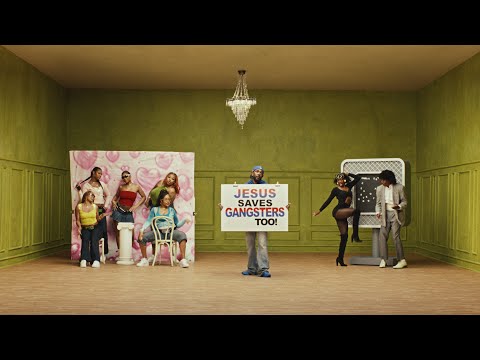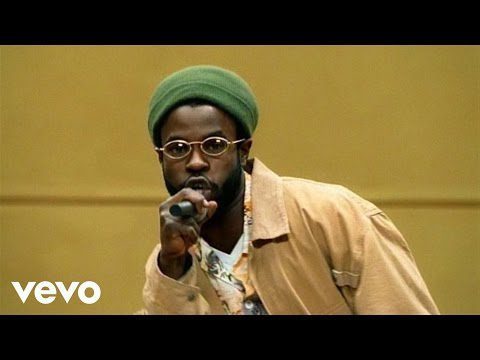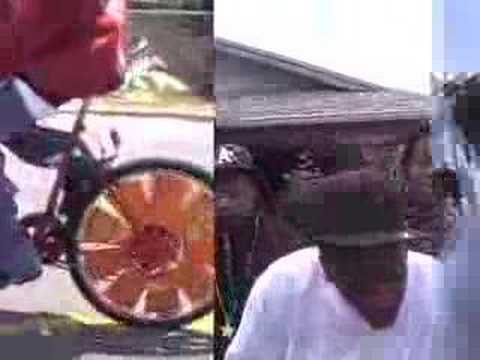
Kendrick Lamar “Squabble Up” Music Video: 8 Key References You May Have Missed

Get ready for a no-brainer phrase that’s already been cooked to death: Kendrick Lamar’s new album GNX is a love letter to many things. But above all, it’s an exciting and passionate celebration of Black culture, the West Coast, and hip-hop. So it should come as no surprise that our first visuals from the project, the “squabble up” music video, are filled to the brim with the type of galaxy-brained, deep, sometimes simple, but always compelling references that he’s become so beloved and also infamous for. Drake was joking about quintuple-entendres back during his “Taylor Made Freestyle” diss, and K.Dot himself raps the following on the new LP’s opener, “wacced out murals”: “F**k a double entendre, I want y’all to feel this s**t.“
While most of the easter eggs and callbacks in the “squabble up” music video don’t carry those multiple meanings and subtle shots, they do present a very rich, appreciative, and distinct snapshot of Black and West Coast culture that many fans appreciated. Whether it’s showing a love for classic film and television, iconic albums, cultural legends, or the history of Black political identity and advocacy, Kendrick Lamar came through with some really slick homages… Plus plenty of homework for people out of the loop. We’re sure we missed plenty of significant inclusions such as the Compton Christmas parade and a CUZZOS cameo, so make sure to point out your favorite finds in the comments section down below.
The Roots‘ “The Next Movement” Music Video

First up is the most obvious and present visual reference throughout Kendrick Lamar’s “squabble up” music video. The shoot’s set itself and the compositional framing parallel that of The Roots’ 1999 music video for “The Next Movement” off of their classic album Things Fall Apart… Save for the velvet curtains, changes in lighting, and topsy-turvy blocking. The color of the walls, the lights on the ceiling, and even the square ridges around the room all evoke Black Thought and company’s original video, while still very much making the new homage its own thing.
However, this is one of the more surprising and unexpected tributes you’ll find in Kendrick Lamar’s “squabble up” music video. That’s because there isn’t really much of a West Coast connection here, but The Roots are undeniably one of the all-time legendary hip-hop groups that always have a lot to say about culture, politics, and history. As such, it’s not a complete shocker, especially when you consider that GNX as an album is filled with these loving celebrations of rap music and its legends. From the Rakim evocations on “tv off,” the very clear Nas interpolation on “man at the garden,” plus some other lyrical nods to folks like Biggie Smalls, the Compton lyricist is proud to represent the art form beyond his regional barriers.
African-American Flag + Black Panther Party
This particular section of “squabble up” has many important nods, plus some still unexplained ones like the two balloons. But let’s get one of them out of the way by reminding ignorant readers that the flags featured in this segment are not a nod to EbonyPrince2k24. That’s the African-American flag designed by artist David Hammons in 1990. It replaces the red, white, and blue of the United States flag with the colors of the Pan-African flag, which represents the African diaspora, pan-Africanism, and Black nationalism. Even though its creator Marcus Garvey and his ideologies have faced a lot of historical reevaluation over the years, the Pan-African flag still stands as a powerful call for African unity across colonized and diaspora populations against a system that would rather quell them. In the context of Black plight in the U.S., the African-American flag reclaims that cultural heritage.
In addition, toward the end of “squabble up,” Kendrick Lamar stands near what looks like a Black Panther Party statue and some artwork of Black Jesus. Furthermore, all these elements combine to speak on themes of Black mobilization, unity, identity, political thought, advocacy, and empowerment. Also, it speaks to the different layers of loyalty and confrontation that Kendrick engages in. This one is more about Black culture versus its exploiters, but there’s also West Coast culture versus its naysayers and Dot himself versus the rap game. Throughout it all, he doesn’t flinch. Still, this is not the writer to speak on this deeply (or any of these references, for that matter), so we encourage you to branch out with your own diligent, self-aware, and respectful research if you aren’t a part of the community.
Kendrick Lamar’s “Dummies” Book
Not every single reference in the “squabble up” music video is worthy of a full breakdown. Sometimes, it’s just a funny and gassed-up flex. For example, the most confident part of the whole visual is when Kendrick Lamar sits down to read a book titled How To Be More Like Kendrick For Dummies. Of course, when you’re making so many homages in a music video for a song off an album that pulls so much from past and contemporary hip-hop artists both in and outside of the West Coast, this is a pretty ironic statement that shoots itself in the foot a bit. But it works just as well as a boisterous bite from the 37-year-old to everyone under him in the rap game. He probably thinks that all of them want a copy, but if they think those attempts will help them, they’re probably dummies.
Trunk Boiz’s “Scraper Bike” Music Video

The last key reference in this part of Kendrick Lamar’s “squabble up” is the Trunk Boiz’s first hit, “Scraper Bike.” It introduced the hip-hop audience to the scraper bike scene in Oakland back in 2007, and you can see the “ThatGO” bike from its music video appear in this new GNX visual. It’s yet another Bay Area-adjacent nod, and also anchors “squabble up” in a pretty millennial timeframe for its audience. Sure, there are a lot of references across a couple of decades, but this is a deep cut from the 2000s that folks probably needed to particularly tap in for. Some folks say that the Trunk Boiz themselves are the ones in the video, but we can’t confirm that just yet. Check in down there in the comments if you’ve got the scoop.
Ice-T’s Power Album & Taz Arnold
Ice-T is one of gangster rap’s most pivotal pioneers on the West Coast, so a shoutout to his craft and contributions was a perfect addition. “squabble up” features a woman with a shotgun in the back of the room, calling back to Ice’s 1988 album Power. Also, style icon and Sa-Ra group member Taz Arnold appears at around the same time, holding up “Hood Love” four-finger rings (which possibly alludes to Spike Lee’s classic 1989 film Do The Right Thing, too).
In addition, Kendrick Lamar wears all-blue in this music video, just like Ice-T on the Power cover. It’s an interesting decision given his all-red attire at “The Pop Out” on Juneteenth. More importantly, it might represent the gang unity that Kendrick’s been so adamant about this year, to which there are some other allusions in “squabble up.”
Soul Train Scramble Board
Another obvious but beloved inclusion in Kendrick Lamar’s “squabble up” music video is the Scramble Board from the legendary TV show Soul Train. That was one of the mainstays of the program, in which dancers had to unscramble the board and piece together the letters to form the name of that show’s performer or a renowned individual in Black culture. As you can probably guess, folks immediately put their tinfoil hats on and attempted to decipher this Scramble Board for themselves. The biggest clue spreading around the Internet right now is that “omnia est aliquid” – which is what’s spelled out in the visuals – roughly translates to “Everything is something” in Latin. What does that mean? No idea. But if everything is something, maybe we just need a couple more days to figure it out…
Menace II Society
Spoiler warning if you’re reading this from under a rock… Although the embeds probably ruined it anyway. Menace II Society is the Hughes brothers’ 1993 directorial debut, and it’s an essential piece of not just Los Angeles media, but Black cinema during the ’90s and beyond. It narrates the story of Caine Lawson and his friends in the Watts and Crenshaw communities, and the crime drama ends tragically as a child on a toy tricycle witnesses horrific murder. “squabble up” features an actor portraying that same orange-jacketed boy on a tricycle, and the camera focuses on him when Kendrick Lamar raps the following line: “Don’t hit him, he got kids with him, my apologies.” It’s an ominous sign and a pretty dark one, too, but the lyrics and visuals also point to an alternate ending for the original movie in which that kid didn’t see what he saw.
Nate Dogg & Isaac Hayes Albums
Finally, Kendrick Lamar’s “squabble up” music video references to two beloved records with key differences and similarities. The late great Nate Dogg’s G-Funk Classics, Vol. 1 & 2 CD hangs from the chandelier in one shot, paying homage to the Long Beach legend’s debut studio album. The second LP is one of Isaac Hayes’ best albums, 1971’s Black Moses, as a man stands in the room wearing the same clothing depicted on the cover art. In particular, this era of the Memphis soul legend preceded and led up to his performance at the Wattstax benefit concert in Los Angeles in 1972, commemorating the seventh anniversary of the Watts riots in 1965. This Hayes-honoring man appears right when other portraits of Black Jesus are on screen, calling back to themes of nationalism, identity, and community.
Even though Isaac Hayes is not from Los Angeles, both albums here have significant connections to the West Coast… and perhaps to Kendrick Lamar himself. Both Hayes and Nate Dogg’s LPs are double albums, and you’ve probably already heard the theory that we’ll get a more grand, thematic, and formal K.Dot album very soon in the wake of GNX. Will that manifest? We can’t wait to find out. Either way, as the visuals for “squabble up” prove, Kendrick gave us so much food for thought with this album and its rollout (or lack thereof) that a long or short wait can’t dampen our excitement for what’s next or our excited appreciation of what’s here.
About The Author
Gabriel Bras Nevares is a staff writer for HotNewHipHop. He joined HNHH while completing his B.A. in Journalism & Mass Communication at The George Washington University in the summer of 2022.
Born and raised in San Juan, Puerto Rico, Gabriel treasures the crossover between his native reggaetón and hip-hop news coverage, such as his review for Bad Bunny’s hometown concert in 2024. But more specifically, he digs for the deeper side of hip-hop conversations, whether that’s the “death” of the genre in 2023, the lyrical and parasocial intricacies of the Kendrick Lamar and Drake battle, or the many moving parts of the Young Thug and YSL RICO case.
Beyond engaging and breaking news coverage, Gabriel makes the most out of his concert obsessions, reviewing and recapping festivals like Rolling Loud Miami and Camp Flog Gnaw. He’s also developed a strong editorial voice through album reviews, think-pieces, and interviews with some of the genre’s brightest upstarts and most enduring obscured gems like Homeboy Sandman, Bktherula, Bas, and Devin Malik.
…

